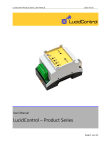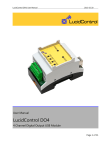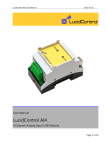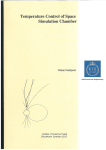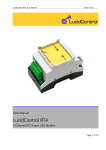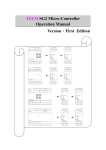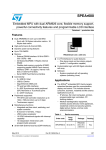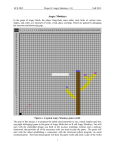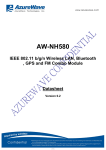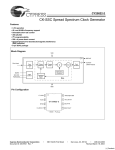Download User Manual LucidControl AO4 USB Analog Output Module
Transcript
LucidControl AO4, User Manual
2015-03-02
User Manual
LucidControl AO4
4 Channel Analog Output USB Module
Page 1 of 23
LucidControl AO4, User Manual
2015-03-02
1 Introduction
This document describes the functionality of the LucidControl AO4 USB module generating
4 analog voltages or currents controllable via Universal Serial Bus.
A basic description of the complete LucidControl product family can be found in the
document LucidControl User Manual.
This document concentrates on the specific topics of the analog output module which is
described here with all its details. In order to set up the module in a fast way please see the
LucidControl AO4 One Sheet Manual
which provides all information necessary to start working with the module out of the box
without reading lots of documentation.
2 Hardware
Fig. 1 shows the sketch of the Analog Output AO4 module
with 4 analog voltage or current outputs.
All LucidControl modules have two connectors, one USB
connector and an IO- Connector which makes it easy to
setup them.
While the upper USB connector is used for interconnection
with the computer, the lower IO-Connector is used for
inputs and outputs.
The IO Connector provides 8 terminals in total - two for
each output.
Fig. 1 Digital Output Module
Page 2 of 23
LucidControl AO4, User Manual
2015-03-02
2.1 Configurations
LucidControl AO4 is available with the following output types:
Module Type
Type Number
Positive
Outputs
LCTR-AO4-5
LCTR-AO4-10
LCTR-AO4-24
Symmetrical
Outputs
LCTR-AO4-12-S
Output Voltage Range
VMin
VMax
0V
5V
0V
10 V
0V
24 V
-12 V
12 V
Tab. 1 Output Voltage Range
Module Type
Type Number
Positive
Outputs
LCTR-AO4-20M0
LCTR-AO4-20M4
Output Voltage Range
IMin
IMax
0A
20 mA
4 mA
20 mA
Tab. 2 Output Current Range
2.2 Interface and Interconnection
2.2.1 USB Connection
LucidControl USB modules are connected to the computer by using a standard USB cable
which must not extend a length of 5 m. They are “bus powered” which means that the host
computer supplies the module with power.
LucidControl AO4 module is rated with a maximum current of 250 mA.
Note:
Supplying USB devices with power is not critical using a desktop computer or notebooks
but it must be considered that the total power of one USB port is limited to 500 mA.
Note:
The USB ports of the Raspberry Pi® are limited to a current of 100 mA. This must be taken
into account when the outputs of the AO4 module are used for sourcing loads. In the case
that the module interfaces high resistive loads, up to two devices can be connected to the
Raspberry Pi without the necessity of an active USB-Hub.
Note:
Using an active USB-Hub with its own power supply allows the connection of additional
devices in the case that the host is not able to supply them.
Page 3 of 23
LucidControl AO4, User Manual
2015-03-02
2.2.2 IO Connection
Fig. 2 shows the interconnection of the voltage output module in
a typical application.
In this application the analog output voltages are sourcing LEDs.
The terminals 2, 4, 6 and 8 are internally connected to ground.
Fig. 2 Voltage Output Module
Connection
Fig. 3 shows the interconnection of the current output module.
The outputs are connected to current measurement devices.
The terminals 2, 4, 6 and 8 are internally connected to ground.
Fig. 3 Current Output Module
Connection
The load current per channel must not exceed IChMax. The sum of all 4 output
channels must not exceed ITotalMax.
Page 4 of 23
LucidControl AO4, User Manual
2015-03-02
2.2.2.1 4 Voltage Outputs
The voltage output module shown in Fig. 3 consists of 4 independent
voltage sources as they are shown in Fig. 4.
The positive outputs are connected to the terminals 1, 3, 5 and 7 of the
IO Connector. The remaining terminals 2, 4, 6, 8 are connected to
ground.
Fig. 4 Voltage
Source
2.2.2.2 2 Floating Voltage Outputs
All 4 voltage outputs share a common ground. A floating output
can be achieved by connecting the outputs as shown in Fig. 5. In
the picture two of the 4 independent voltage sources are
connected in series.
Voltage output modules providing positive and negative voltages
e.g. LCTR-AO4-12-S are able to double their output voltage. By
connecting this module as shown in Fig. 5 can create voltages in
the range of -24V to +24V.
Fig. 5 Symmetrical Voltage
Outputs
2.2.2.3 Current Outputs
The current output module shown in Fig. 3 consists of 4 independent
current sources as they are shown in Fig. 6.
The positive outputs are connected to the terminals 1, 3, 5 and 7 of the
IO Connector. The remaining terminals 2, 4, 6, 8 are connected to
ground.
Fig. 6 Current
Source
Page 5 of 23
LucidControl AO4, User Manual
2015-03-02
2.3 Setup of Hard- and Software
Setting up LucidControl hardware is extremely easy:
1 Ensure that no signal is applied to the IO Connector
2 Connect LucidControl via USB with the computer
3 Applies for Microsoft windows only: The system asks for an installation file. This is
not a driver but only an information file (INF). The file can be downloaded from our
website www.lucid-control.com/downloads
4 That’s all. LucidControl switches the green power LED on and the module is ready
for usage.
2.3.1 Windows
As mentioned the installation under Microsoft Windows requires the information file.
After finished installation the Windows Device Manager contains a new serial port (COM).
The module can be accessed using this port.
Note:
Even if more than one module is connected to a computer Windows ensures that the same
serial port number is assigned to the module(s) after restart.
2.3.2 Linux
Despite to Windows installation under Linux the module is usable immediately after
connection without any additional steps. Linux installs /dev/ttyACM devices for any
module connected to the computer.
Note:
By default Linux cannot ensure that the same /dev/ttyACM device is assigned to the same
module on restart. But as long as only one module is connected to the computer it is
ensured that it is accessible via /dev/ttyACM0.
This problem can be solved by the LucidIoCtrl command line tool which can create static
devices always pointing to a specific module. Moreover the device can be given useful
names e.g. dev/digitalIoKitchen.
Page 6 of 23
LucidControl AO4, User Manual
2015-03-02
2.3.3 Get command line LucidIoCtrl
LucidIoCtrl command line tool can be downloaded from our website:
www.lucid-control.com/downloads
This page provides the command line tool LucidIoCtrl for different architectures.
After downloading the program can be stored in a folder of choice.
Please see the section 3 of the general LucidControl User Manual for more information
about this helpful tool.
2.3.4 Ready to Start
After the module was installed successfully (if it was necessary at all) the green Power LED
is switched on signaling that the module is ready for use.
Since the module was preconfigured for standard output mode, it can be used without
further configuration. The following examples demonstrate the functionality of the module
by using the LucidIoCtrl command line tool.
The following examples demonstrate the functionality of the module by using the
LucidIoCtrl command line tool.
Windows Examples:
For all examples it is assumed that the module is connected to COM1.
Set the values of all 4 voltage output channels. Value of CH0 = 5.000 V, CH1 = 2.500 V,
CH2 = 1.250 V, CH3 = 0.625 V
LucidIoCtrl –dCOM1 –tV –c0,1,2,3 –w5.000,2.500,1.250,0.625 [ENTER]
Set the values of all 4 current output channels. Value of CH0 = 5.000 mA, CH1 = 2.500 mA,
CH2 = 1.250 mA, CH3 = 0.625 mA
LucidIoCtrl –dCOM1 –tC –c0,1,2,3 –w5.000,2.500,1.250,0.625 [ENTER]
Linux Examples:
For all examples it is assumed that the module is connected to /dev/ttyACM0.
Set the values of all 4 output channels. Value of CH0 = 5.000 V, CH1 = 2.500 V, CH2 =
1.250 V. CH3 = 0.625 V
LucidIoCtrl –d/dev/ttyACM0 –tV –c0,1,2,3 –w5.000,2.500,1.250,0.625 [ENTER]
Page 7 of 23
LucidControl AO4, User Manual
2015-03-02
Set the values of all 4 current output channels. Value of CH0 = 5.000 mA, CH1 = 2.500 mA,
CH2 = 1.250 mA, CH3 = 0.625 mA
LucidIoCtrl –d/dev/ttyACM0 –tC –c0,1,2,3 –w5.000,2.500,1.250,0.625 [ENTER]
Page 8 of 23
LucidControl AO4, User Manual
2015-03-02
3 Module Operation
The LucidControl AO4 Analog Output Module generates 4 independent output voltage or
current signals.
The Hardware of the AO4 module consists of 2
independent DAC (Digital Analog Converter). By
multiplexing each DAC, 4 output voltages or currents are
created in total.
Fig. 7 illustrates the output processing in standard mode.
Each of the two DAC is responsible for the generation of
two analog output signals.
Fig. 7 Output Processing
The processing of both DAC channels is operating in
parallel the same way. For simplicity only the processing
of one DAC is shown in Fig. 7.
The lower diagram in Fig. 7 shows the DAC output signals – a higher for output 1, a lower
voltage for output 2.
The upper diagram depicts the timing sequence of the output multiplexing and refreshing
algorithm for each DAC.
After the DAC set the updated voltage of output 1 and TSetup has passed the output
multiplexer applies the signals to the output circuit. TSetup is a guard time preventing to
overwrite the stable voltage of the last refresh cycle.
The voltage is applied to the output circuit for the time TRefresh. After refreshing has
completed, the DAC generates the updated signals of output 2. Output 2 is processed the
same way as output 1 was.
The refreshing algorithm repeats periodically after TInterval has passed.
Even if TSetup, TRefresh and TInterval can be adjusted for each output channel independently,
this should only be taken into account if it is necessary since changing these parameters
may have unexpected consequences like skipped output channels or high voltage ripple.
The relevant IO Configuration Parameters are outAnSetupTime (see 3.4.5),
outAnRefreshTime (see 3.4.4) and outAnRefreshInterval (see 3.4.3).
At any time it is possible to restore the default values of changed parameters.
Page 9 of 23
LucidControl AO4, User Manual
2015-03-02
3.1 Operation Modes
3.1.1 Inactive Mode
Setting an output to inactive mode disables processing of the output and sets the output
voltage to minimum value (e.g. 0 V).
Setting an output to Inactive Mode does not suspend the output processing and
refreshing but forces the output voltage to minimum value.
3.1.2 Standard Mode
In standard mode the processing of the analog output is executed as described in section
3.
3.2 Offset Compensation
In some cases it is necessary to compensate an offset signal by adding a value to the
output voltage or current.
The signed value of the IO Configuration Parameter outAnOffset (see 3.4.6) is added to the
output signal and allows an offset correction.
3.3 Commands
Accessing inputs and outputs is a very common task which is mostly identical for all
LucidControl modules. For this task output modules provide the commands SetIo for
writing a single value and SetIoGroup for writing a group of values of the same type.
The command GetIo supports reading of the state of a single output value while
GetIoGroup reads a group of output values of the same type.
For more comprehensive information covering reading and writing of inputs and outputs
please see the sections 3.2.1.1, 3.2.1.2 and 4.3 of the general LucidControl manual.
The following sections describe in detail the commands which are supported by the AO4
module.
3.3.1 SetIo
This command sets the output signal of one output channel.
Page 10 of 23
LucidControl AO4, User Manual
2015-03-02
Command
Opcode
SetIo
0x40
Access
Write
Call (-tV)
LucidIoCtrl –d[COMx] –c[Channel] –tV –w[Voltage]
LucidIoCtrl –d[COMx] –c[Channel] –tC –w[Current]
LucidIoControl Command Line Tool
Note:
When using the LucidIoCtrl command line tool, the distinction between the SetIo and
SetIoGroup commands is not necessary since LucidIoCtrl command line tool handles this
automatically.
LucidIoCtrl Command Line Tool Example
Set output channel 0 to 2.540 V:
LucidIoCtrl –dCOM4 –c0 –tV –w2.540 [ENTER]
Set output channel 0 to 10 mA:
LucidIoCtrl –dCOM4 –c0 –tC –w10 [ENTER]
Request Frame
OPC
P1
0x40
Channel
P2
Value Type
LEN
Length
Data Field
Value
Value
Description
Channel
Number of input or output channel (Range: 0 ~ 3)
Value Type Value Type
Supported Value Types
Value Type
Value Range
Signed Voltage
-100,000,000 µV ~
Resolution 1 µV
100,000,000 µV
(0x1D)
(-100 V ~ 100 V)
Signed Voltage
-30,000 mV ~
Resolution 1 mV
30,000 mV
(0x1C)
(-30 V ~ 30 V)
Signed Current
-1,000,000 µA ~
Resolution 1µA
1,000,000 µA
(0x23)
(-1 A ~ 1A)
Length
Length of the Values in the Data Field
Value
Length
4 Bytes
2 Bytes
4 Bytes
Values accordingly to the Value Type
Tab. 3 SetIo Request
Page 11 of 23
LucidControl AO4, User Manual
2015-03-02
Response Frame
Status
Length
Status
0
The command does not return any data. In the case of an error the command returns
Execution Status Code documented in section 4.4 of the LucidControl User Manual.
3.3.2 SetIoGroup
This command sets the voltage or current of a group of output channels of the same Value
Type.
Command
Opcode
SetIoGroup
Access
Write
0x42
LucidIoControl Command Line Tool
Call (-tV)
LucidIoCtrl –d[COMx] –c[Channels] –tV –w[Voltages]
LucidIoCtrl –d[COMx] –c[Channels] –tC –w[Currents]
Channels:
Comma separated list of channels e.g. –c0,2,3
Values:
Comma separated list of voltages or currents to set e.g. –w1.25,2.5,7.5
LucidIoCtrl Command Line Tool Example
Set output channel 0 to 1.25 V, output channel 2 to 2.50 V and output channel 3 to 7.50:
LucidIoCtrl –dCOM4 –c0,2,3 –tV –w1.25,2.5,7.5 [ENTER]
Set output channel 0 to 5 mA, output channel 2 to 15.5 mA and output channel 3 to 20:
LucidIoCtrl –dCOM4 –c0,2,3 –tC –w5,15.5,20 [ENTER]
Request Frame:
OPC
P1
Channel
0x40
Mask
P2
LEN
Data Field
Value Type
Length
Value(s)
Page 12 of 23
LucidControl AO4, User Manual
Value
Channel
Mask
Value
Type
Length
Values
2015-03-02
Description
Channel Mask
Specifies the output channels to access
Channel
Bit Position
Value
0
0
0x01
1
1
0x02
2
2
0x04
3
3
0x08
Values are bitwise or combined
Examples:
Accessing channel 0 and 3
Value = 0x01 OR 0x08 = 0x09
Accessing channel 1 and 2
Value = 0x02 OR 0x04 = 0x06
Value Type
Supported Value Types
Value Type
Value Range
Length
Signed Voltage
-100,000,000 µV ~
Resolution 1 µV
100,000,000 µV
4 Bytes
(0x1D)
(-100 V ~ 100 V)
Signed Voltage
-30,000 mV ~
Resolution 1 mV
30,000 mV
2 Bytes
(0x1C)
(-30 V ~ 30 V)
Signed Current
-1,000,000 µA ~
Resolution 1µA
1,000,000 µA
4 Bytes
(0x23)
(-1 A ~ 1A)
Length of the Values in the Data Field (One Value for each channel)
One or more values to set in ascending channel order
Tab. 4 SetIoGroup Request
Response Frame
Status
Length
Status
0
The command does not return any data. In the case of an error the command returns
Execution Status Code documented in section 4.4 of the LucidControl User Manual.
Example of SetIoGroup
The following request frame sets outputs 0 to 1.25 V and output 1 to 2.5 V.
Page 13 of 23
LucidControl AO4, User Manual
Request Frame
OPC
P1
P2
2015-03-02
LEN
Data Field
Byte
0x42
0x03 0x1D 0x08
Value Output 0
Value Output 1
0
1
2
3
4
5
6
7
0xD0 0x12 0x13 0x00 0xA0 0x25 0x26 0x00
Channel Mask for Param1:
Output Values in Data Field are sorted:
0x01 OR 0x02 = 0x03
Channel 0, Channel 1
Response Frame:
Status
Length
0x00
0x00
3.3.3 GetIo
This command reads the voltage or current of the analog output.
Command
Opcode
GetIo
0x46
Access
Call (-tL)
LucidIoCtrl –d[COMx] –c[Channel] –tV –r
LucidIoCtrl –d[COMx] –c[Channel] –tC –r
Return
CHn:VV
n
VV
Read
LucidIoControl Command Line Tool
Output Channel
Output Value
Note
When using the LucidIoCtrl command line tool the distinction between GetIo and
GetIoGroup commands is not necessary since the program handles this automatically.
LucidIoCtrl Command Line Tool Example
Read voltage of output channel 0
->
LucidIoCtrl –dCOM4 –c0 –tV -r [ENTER]
CH0:5.00000
Read current of output channel 0
->
LucidIoCtrl –dCOM4 –c0 –tC -r [ENTER]
CH0:5.00000
Page 14 of 23
LucidControl AO4, User Manual
Request Frame
OPC
P1
0x46
Channel
2015-03-02
P2
Value Type
LEN
0
Value
Description
Channel
Number of input or output channel (Range: 0 ~ 3)
Value Type Supported Value Types
Value Type
Value Range
Signed Voltage
-100,000,000 µV ~
Resolution 1 µV
100,000,000 µV
(0x1D)
(-100 V ~ 100 V)
Signed Voltage
-30,000 mV ~
Resolution 1 mV
30,000 mV
(0x1C)
(-30 V ~ 30 V)
Signed Current
-1,000,000 µA ~
Resolution 1µA
1,000,000 µA
(0x23)
(-1 A ~ 1A)
Length
4 Bytes
2 Bytes
4 Bytes
Tab. 5 GetIo Request
Response Frame:
In case of successful execution the command returns the value of the specified channel
number.
Status
Status
LEN
Length
Data Field
Value
In the case of an error the command returns Execution Status Code documented in section
4.4 of the LucidControl User Manual.
3.3.4 GetIoGroup
This command reads the voltage or currents of a group of analog outputs of the same
Value Type.
Page 15 of 23
LucidControl AO4, User Manual
2015-03-02
Command
Opcode
GetIoGroup
Access
Read
0x48
LucidIoControl Command Line Tool
Call (-tV)
LucidIoCtrl –d[COMx] –c[Channels] –tV –r
LucidIoCtrl –d[COMx] –c[Channels] –tC –r
Return
Channels:
Comma separated list of channels e.g. –c0,1,3
List of values sorted from lower to higher channels
CHn:VV
n
Input Channel
VV
Output Value
LucidIoCtrl Command Line Tool Example
Read output voltages of channel 0, 1 and 3:
->
LucidIoCtrl –dCOM4 –c0,1,3 –tV –r [ENTER]
CH0:1.25000 CH1:2.50000 CH3:5.00000
Read output cuttents of channel 0, 1 and 3:
->
LucidIoCtrl –dCOM4 –c0,1,3 –tC –r [ENTER]
CH0:1.25000 CH1:2.50000 CH3:5.00000
Request Frame
OPC
0x48
P1
Channel
Mask
P2
LEN
Value Type
0
Page 16 of 23
LucidControl AO4, User Manual
2015-03-02
Value
Channel
Mask
Value
Type
Description
Channel Mask
Specifies the output channels to access
Channel
Bit Position
Value
0
0
0x01
1
1
0x02
2
2
0x04
3
3
0x08
Values are bitwise or combined
Examples:
Accessing channel 0 and 3
Accessing channel 1 and 2
Supported Value Types
Value Type
Signed Voltage
Resolution 1 µV
(0x1D)
Signed Voltage
Resolution 1 mV
(0x1C)
Signed Current
Resolution 1µA
(0x23)
Value = 0x01 OR 0x08 = 0x09
Value = 0x02 OR 0x04 = 0x06
Value Range
-100,000,000 µV ~
100,000,000 µV
(-100 V ~ 100 V)
-30,000 mV ~
30,000 mV
(-30 V ~ 30 V)
-1,000,000 µA ~
1,000,000 µA
(-1 A ~ 1A)
Length
4 Bytes
2 Bytes
4 Bytes
Tab. 6 GetIoGroup Request
Response Frame:
In case of successful execution the command returns the read values of the channels
specified in the Channel Mask.
Status
Status
LEN
Length
Data Field
Value(s)
In the case of an error the command returns Execution Status Code documented in section
4.4 of the LucidControl User Manual.
Example of GetIoGroup Request:
The following request frame reads outputs 0 and 1. It returns the output voltages as signed
4 byte result.
Opcode
P1
P2
Length
0x48
0x03
0x1D
0x00
Channel Mask (P1):
0x01 OR 0x02 = 0x03
Page 17 of 23
LucidControl AO4, User Manual
2015-03-02
Response Frame:
Output 0 = 1.25 V, output 1 = 2.50 V. Values in Data Field are in ascending channel order.
Header Field
Status
0x00
Data Field
LEN
0x08
Bytes
0
0xD0
Value 0
1
2
0x12 0x13
3
0x00
4
0xA0
Value 1
5
6
0x25 0x25
7
0x00
3.4 Parameters
LucidControl IO modules can be configured by a set of System Configuration Parameters
ans IO Configuration Parameters.
The Parameters are accessible via the SetParam and GetParam command which are
described in sections 4.3.5 and 4.3.6 of the LucidControl User Manual.
3.4.1 outAnValue
This IO Configuration Parameter represents the voltage or current value of the analog
output.
Parameter
outAnValue
Access
Address
0x1000
Values
Voltage or current in 1 µV resolution
Default Value
0
Parameter Type
LucidIoCtrl Command Line Tool
4 bytes signed
-100,000,000 µV ~
100,000,000 µV
or
-1,000,000 µA ~
1,000,000 µA
Parameter Name
outAnValue
Call (Set)
LucidIoCtrl –d[COMx] –c[Channel] –soutAnValue[=Value] {-p}
{--default}
LucidIoCtrl –d[COMx] –c[Channel] –goutAnValue
Call (Get)
Parameter Values
Read / Write
LucidIoCtrl Command Line Tool Example
Set output voltage of channel 0 to 5 V and make the setting persistent.
LucidIoCtrl –dCOM4 –c0 –soutAnValue=5000000 –p [ENTER]
Read output voltage of channel 0 (value is 5 V).
->
LucidIoCtrl –dCOM4 –c0 –goutAnValue [ENTER]
outAnValue=5000000
Page 18 of 23
LucidControl AO4, User Manual
2015-03-02
By using outAnValue an output value can be made persistent. In this case the stored
voltage or current level is restored after a restart of the module.
Note:
For normal operation it is recommended to use the functions SetIo (see 0) and GetIo (3.3.3)
in order to access the output channel value.
3.4.2 outAnMode
This IO Configuration Parameter configures the operation mode of the output.
Parameter
Address
Values
outAnMode
0x1100
Output Mode
Byte
0x00
0x01
Access
Read / Write
Mode
inactive
standard
Default Value
standard
Parameter Type
1 byte unsigned
LucidIoCtrl Command Line Tool
Parameter Name
outAnMode
Parameter Values
inactive / standard
LucidIoCtrl
–d[COMx]
–c[Channel]
–soutAnMode[=Mode]
{-p}
Call (Set)
Call (Get)
{--default}
LucidIoCtrl –d[COMx] –c[Channel] –goutAnMode
LucidIoCtrl Command Line Tool Example
Set operation mode of output channel 0 to Standard Mode and make the setting
persistent.
LucidIoCtrl –dCOM4 –c0 –soutAnMode=standard –p [ENTER]
Read the operation mode of input channel 0.
->
LucidIoCtrl –dCOM4 –c0 –goutAnMode [ENTER]
outAnMode=standard
3.4.3 outAnRefreshInterval
This IO Configuration Parameter configures the output refresh interval TInterval.
Parameter
Address
outAnRefreshInterval Access
0x1111
TInterval in µs (micro seconds)
Values
1 ms ≤ TInterval ≤ 100 ms
Default Value
10 ms
Parameter Type
LucidIoCtrl Command Line Tool
Read / Write
4 bytes unsigned
Page 19 of 23
LucidControl AO4, User Manual
Parameter Name
Call (Set)
Call (Get)
2015-03-02
outAnRefreshInterval
Parameter Values
Time [µs]
LucidIoCtrl –d[COMx] –c[Channel]
–soutAnRefreshInterval[=Time] {-p} {--default}
LucidIoCtrl –d[COMx] –c[Channel] –goutAnRefreshInterval
LucidIoCtrl Command Line Tool Example
Set TInterval of output channel 0 to 20 ms and make the setting persistent.
LucidIoCtrl –dCOM4 –c0 –soutAnRefreshInterval=20000 –p [ENTER]
Read TInterval parameter of input channel 0.
->
LucidIoCtrl –dCOM4 –c0 –goutAnRefreshInteral[ENTER]
outAnRefreshInterval=20000
3.4.4 outAnRefreshTime
This IO Configuration Parameter configures the output refresh time TRefresh
Parameter
Address
outAnRefreshTime
Access
0x1113
TRefresh in µs (micro seconds)
Values
0.1 ms ≤ TRefresh ≤ 10 ms
Default Value
1 ms
Parameter Type
LucidIoCtrl Command Line Tool
Parameter Name
outAnRefreshTime
Parameter Values
LucidIoCtrl
–d[COMx]
–c[Channel]
Call (Set)
Call (Get)
Read / Write
4 bytes unsigned
Time [µs]
–soutAnRefreshTime[=Value] {-p} {--default}
LucidIoCtrl –d[COMx] –c[Channel] –goutAnRefreshTime
LucidIoCtrl Command Line Tool Example
Set TRefresh of output channel 0 to 5 ms and make the setting persistent.
LucidIoCtrl –dCOM4 –c0 –soutAnRefreshTime=5000 –p [ENTER]
Read TRefresh parameter of input channel 0
->
LucidIoCtrl –dCOM4 –c0 –goutAnRefreshTime[ENTER]
outAnRefreshTime=5000
3.4.5 outAnSetupTime
This IO Configuration Parameter configures the output refresh setup time TSetup.
Parameter
Address
outAnSetupTime
Access
0x1112
TSetup in µs (micro seconds)
Values
0.1 ms ≤ TSetup ≤ 10 ms
Default Value
1 ms
Parameter Type
LucidIoCtrl Command Line Tool
Parameter Name
outAnSetupTime
Parameter Values
LucidIoCtrl
–d[COMx]
–c[Channel]
Call (Set)
Read / Write
4 bytes unsigned
Time [µs]
–soutAnSetupTime[=Value] {-p} {--default}
Page 20 of 23
LucidControl AO4, User Manual
Call (Get)
2015-03-02
LucidIoCtrl –d[COMx] –c[Channel] –goutAnSetupTime
LucidIoCtrl Command Line Tool Example
Set TSetup of output channel 0 to 1.5 ms and make the setting persistent.
LucidIoCtrl –dCOM4 –c0 –soutAnSetupTime=1500 –p [ENTER]
Read TSetup parameter of input channel 0
->
LucidIoCtrl –dCOM4 –c0 –goutAnSetupTime[ENTER]
outAnSetupTime=1500
3.4.6 outAnOffset
This IO Configuration Parameter configures the output offset compensation value which is
described in section 3.2.
Parameter
Address
outAnOffset
Access
Read / Write
0x1120
Offset Compensation in 1 mV steps (-3 V ~ 3 V)
Values
-3,000 ~ 3,000
Default Value
0
Parameter Type
2 bytes signed
LucidIoCtrl Command Line Tool
Parameter Name
outAnOffset
Parameter Values
Voltage [1 mV]
LucidIoCtrl
–d[COMx]
–c[Channel]
–soutAnOffset[=Value]
{-p}
Call (Set)
Call (Get)
{--default}
LucidIoCtrl –d[COMx] –c[Channel] –goutAnOffset
LucidIoCtrl Command Line Tool Example
Set output offset compensation value of output channel 0 to -5 mV and make the setting
persistent.
LucidIoCtrl –dCOM4 –c0 –soutAnOffset=-5 –p [ENTER]
Read Offset Compensation value.
->
LucidIoCtrl –dCOM4 –c0 –goutAnOffset [ENTER]
outAnOffset=-5
Page 21 of 23
LucidControl AO4, User Manual
2015-03-02
4 Specification
Parameter
Condition
Outputs
No of Output Channels
Output - Electrical Characteristics
Output Function
Resolution
Accuracy
Max. Output Error
Max. Output Current per Channel
Max. Output Current of Device
Output – Timing Characteristic
Value Update interval
Setup Time for stable output
DAC Conversion Time
Module – Communication
USB
Module – Electrical Characteristics
Power Supply
Maximum Rated Supply Current
Module – Environment
Temperature
Storage
Operation
Humidity
Module – Housing
Dimensions L x W x H
Weight (in total)
Assembly
Protection Class (DIN 40050)
Module - Indicators
Operation and Error Indicator
Communication Indicator
Software
Supported Operating Systems
Value
4
Digital to Analog Conversion
12 bit
typ. ±0.25 %
of full scale range
± 5 LSB
IChMax
40 mA
ITotalMax
160 mA
TUpdate
TStable
TConv
typ. 10 ms
typ. 1 ms
typ. 1 ms
2.0 Full Speed CDC Profil
USB Bus Powered with +5V
No additional Power Supply
needed.
250 mA
-20 °C … +70 °C
0 °C … +55 °C
< 85 % RH, non-condensing
90 x 54 x 62 mm
120 g
Rail-Mount (EN 50022, TS35)
IP20
Windows® XP, Windows® Vista,
Windows® 7, Ubuntu, Debian,
Raspbian
Page 22 of 23
LucidControl AO4, User Manual
2015-03-02
Application Programming Interface
(API)
Console / Terminal Application,
Java and Python
5 Order Information and Accessories
Order Code
LCTR-AO4-05
LCTR-AO4-10
LCTR-AO4-12-S
LCTR-AO4-20M0
LCTR-AO4-20M4
Product
LucidControl Analog Output USB Module with 4
channels 0 ~ 5 V
LucidControl Analog Output USB Module with 4
channels 0 ~ 10 V
LucidControl Analog Output USB Module with 4
channels ±12 V
LucidControl Analog Output USB Module with 4
channels 0 ~ 20 mA
LucidControl Analog Input USB Module with 4
channels 4 ~ 20 mA.
The following accessories are available:
Order Code
LCTR-AK1710-8
Product
Plug-In Terminal 8-way 1,5 mm² wire
Page 23 of 23
























